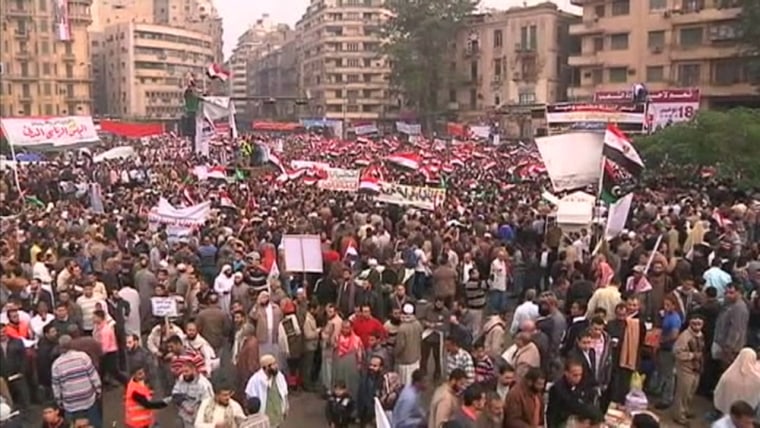Over 50,000 Egyptian protesters flocked to Cairo's Tahrir Square Friday to pressure the military government to transfer power to elected civilian rule, after the cabinet tried to enshrine the army's role in a constitutional proposal.
The protesters sang religious chants before Friday prayers, while others handed out fliers demanding the withdrawal of the constitutional proposal and presidential elections be held no later than April 2012.
"Does the government want to humiliate the people? The people revolted against Mubarak and they will revolt against the constitution they want to impose on us," a member of an orthodox Islamic Salafi group cried out over loud speakers, to the cheers of thousands of protesters.
"Down to military rule" and "No to making the army a state above the state" were some of the chants echoing across Tahrir Square.
Except for the preponderance of bearded men and veiled women typical of strict Islamists, the mass rally recalled the demonstrations in Tahrir Square during the 18-day bloody uprising that toppled President Hosni Mubarak on Feb. 18.
The rally was dominated by the country's most organized political group, the Muslim Brotherhood.
It was called to protest a document floated by the government that declares the military the guardian of "constitutional legitimacy," suggesting the armed forces could have the final word on major policies.
The Brotherhood says the document reinforces "dictatorship," and has promised an escalation if it is not shelved.
Organizers said Friday's rally was an attempt to put "the revolution back on track."
Other groups such as the April 6 movement are demanding a timetable for the end of military rule that began after Mubarak was deposed.
A military source said on Friday that the army would hand power to a civilian government in 2012, without giving a exact date.
Deputy Prime Minister Ali al-Silmi showed a constitutional draft to political groups earlier this month that would give the army exclusive authority over its internal affairs and budget.
But negotiations over the plan between the government and Islamists and liberals have broken down, prompting political parties and democracy campaigners to protest.
"The protest ... is to reclaim power from the army and oppose Silmi's document," said Mohamed Fathi from the youth group the Front to Protect the Revolution.
Any extended protest by demonstrators camping in Tahrir Square could potentially destabilize preparations for a parliamentary vote due on November 28.
Political groups have demanded the military council announce a clear timetable for handing power over to an elected civilian government with a deadline for presidential elections no later than April 2012.
Salafi parties and movements who follow strict Islamic teachings were the earliest to galvanize support for the Friday protest, with the Muslim Brotherhood and a number of liberal parties following suit.
Thousands of Salafi protesters arrived in Cairo from different parts of the country, many waving flags and singing the national anthem while youth groups guarded entrances to the square to prevent thugs from slipping through.
"We came by bus from the Nile Delta. We have been called to come and show our refusal of army rule and support of civilian rule," said Mohamed Ali, a member of the Salafi Al-Asalah party.
In the port city of Alexandria, thousands of Islamists and youth groups also held a rally and planned to head to a military base in a show of protest against the army.
"We went down to demand change but they removed Mubarak and brought the Field Marshal," protesters in Alexandria chanted, referring to Mubarak's former defense minister who now heads the military council that is supposed to guide Egypt to democracy.
Thousands also gathered in the Northern Sinai and Upper Egypt regions to protest but they called for an Islamic state, not a civilian state, the demand of protesters in the capital and Alexandria.
